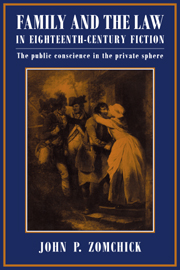Book contents
- Frontmatter
- Contents
- Preface
- Acknowledgments
- 1 Introduction
- 2 Roxana's contractual affiliations
- 3 Clarissa Harlowe: caught in the contract
- 4 Tame spirits, brave fellows, and the web of law: Robert Lovelace's legalistic conscience
- 5 Roderick Random: suited by the law
- 6 Shadows of the prison house or shade of the family tree: Amelia's public and private worlds
- 7 The embattled middle: longing for authority in The Vicar of Wakefield
- 8 Caleb Williams: negating the romance of the public conscience
- Bibliography
- Index
6 - Shadows of the prison house or shade of the family tree: Amelia's public and private worlds
Published online by Cambridge University Press: 10 February 2010
- Frontmatter
- Contents
- Preface
- Acknowledgments
- 1 Introduction
- 2 Roxana's contractual affiliations
- 3 Clarissa Harlowe: caught in the contract
- 4 Tame spirits, brave fellows, and the web of law: Robert Lovelace's legalistic conscience
- 5 Roderick Random: suited by the law
- 6 Shadows of the prison house or shade of the family tree: Amelia's public and private worlds
- 7 The embattled middle: longing for authority in The Vicar of Wakefield
- 8 Caleb Williams: negating the romance of the public conscience
- Bibliography
- Index
Summary
Earlier, when something like the maligned bourgeois division between professional and private life still existed – a division whose passing one almost now regrets – anyone who pursued practical aims in the private sphere was eyed mistrustfully as an uncouth interloper.
Theodor Adorno, Minima Moralia, p. 23Introduction
Henry Fielding's Amelia represents the relation between the public and private spheres, notably the effects of the public sphere on private happiness. Taking their cue from the novel's Preface in which Fielding declares his intention to “disclose some of the most glaring Evils, as well public as private, which at present infest the Country,” many commentators have discussed the interrelations of public and private events in the novel. George Sherburn identifies one of the novel's two main themes as an indictment of corrupt elites, who refuse to recognize and promote individual merit. Leo Braudy writes that “[t]he reader is … invited to look through personal affairs into the public issues. Public and private life are not separated in Amelia; we are shown instead the analogy between them.” In this chapter I will argue that analogy is not precise enough; rather, public events create the need for a new kind of domestic sphere, governed by a sentimental husband, himself chastised by law and thus enabled to defend his family against both corrupt elites in the public sphere and pursuers of practical – that is, distinctly unsentimental – aims in the private.
- Type
- Chapter
- Information
- Family and the Law in Eighteenth-Century FictionThe Public Conscience in the Private Sphere, pp. 130 - 153Publisher: Cambridge University PressPrint publication year: 1993



